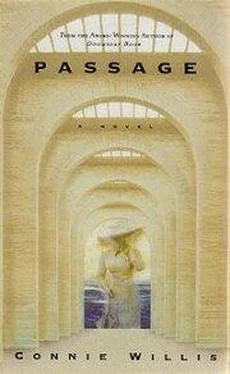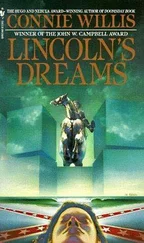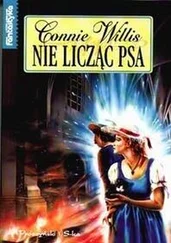I can’t do this, Richard thought, and almost hung up the phone. It’s betraying Joanna. She wouldn’t care, he thought suddenly. All she cared about was getting the message through to me. “I want to come see you,” he said. “Are you in your office?”
“Yes, but I’m afraid I have several appointments this afternoon, and my publisher—” There was a pause, presumably while he checked his schedule. “Would two o’clock… no, I have a meeting… and my publicist’s coming at three… would one o’clock work?”
“One o’clock,” Richard said and hung up, thinking, Hopefully in the next hour and a half the answer will come to me, and I won’t have to talk to him at all.
He started through Joanna’s transcripts again, making a list of everything they contained—swimming pool, Scotland Road, mail room, key—the key. What was the key?—rockets, gymnasium, mechanical bicycles, wireless shack, sacks of mail—looking for common elements with his and Amelia Tanaka’s. They had both talked about doors and bottles, a bottle of chemicals in Amelia’s and of ink in Joanna’s, but there hadn’t been any bottles in his. A key? He had had to turn the key to open the door to the hallway, Mr. Briarley had gone to the mailroom to get the key to the locker that contained the rockets, the sailor who’d operated the Morse lamp had said something about a key, and Amelia, in talking about the catalyst, had said, “I had to find the key.”
That’s pushing it, he thought, and Joseph Leibrecht hadn’t said anything about a key. And key wasn’t one of the words highlighted on the transcripts.
All right then, how about the words that were? Water? There was no water in either his or Amelia’s NDEs, and no fog. Time, he thought, remembering the clock on the wall of the White Star corridor. Amelia had been worried about finishing her final in time, and Joseph Leibrecht had mentioned hearing a church bell ring and knowing it was six o’clock. And the Titanic was all about running out of time.
And speaking of time, what time was it? Ten to one. Just enough time to go ask Vielle what similarities she’d found in the transcripts and then get over to Mandrake’s office.
He went down to third. The walkway had a big sandwich board with “Closed for Repairs” on it. They must have run out of yellow tape, he thought. He’d have to go down to the basement and outside. He started back down the hallway. The pager in his pocket began to beep, a high-pitched, urgent ringing. Maisie’s drill, he thought, pulling it out of his pocket. He pressed the red button. “Six-west,” it said, and under it, the time: 12:58.
Six-west. What’s she doing down there? he thought, and then, the readout sinking in, 12:58. “She said two-ten,” he said and took off running, up to third, across the walkway, up the service stairs.
He made it up to sixth in three minutes and nineteen seconds and flung himself, out of breath, against the nurses’ station. “Quick. Maisie Nellis. Where is she?”
“Down there, second door,” the surprised nurse said, and it still didn’t occur to him, tearing down the hall, that the nurse wouldn’t have been just standing there in an emergency, that there was no code alarm blaring.
He burst into the room, where Maisie lay quietly on a gurney, looking at her pager.
“Did you talk to Mr. Mandrake yet?” she asked eagerly.
“How—could—I?” he said, between panting breaths. “You paged—me. What’s the idea?” He slumped into a chair next to the wall.
“The drill,” she said.
“The drill was supposed to be at two-ten, not twelve fifty-eight.”
“The two-ten was a code,” she said. “They brought me here for some tests, and I thought it was a good idea to do the pager when you didn’t know where I was, to see if it worked or not.”
“Well, it worked,” Richard said, “so no more drills. I only want you paging me in a real emergency. Understand?”
“But shouldn’t we practice a few times?” she said, looking longingly at the pager. “So you could get faster?”
I was fast enough, he thought. I got here in under four minutes, from a point in the hospital almost as far away as there is. I made it in time. And had no way to save her when I got here. “No,” he said. “You page me if you code, and only if you code.”
“What if I think I’m going to code and then it turns out I don’t?”
“Then it had better not also turn out that you just wanted to see me to tell me about the Hartford circus fire. I mean it.”
“Okay,” she said reluctantly.
“Okay.” He looked at his watch. One-ten. “I’m late for my appointment with Mandrake. And don’t say, ‘You can’t go yet.’ ”
“I wasn’t going to,” she said indignantly. “I was going to wish you good luck.”
It was going to take a lot more than luck, Richard thought, looking at Mandrake seated behind a polished expanse of desk. “I expected you at one,” Mandrake said, looking pointedly at his watch. “Now, I’m afraid I have another—”
The phone rang. “Excuse me,” Mandrake said and picked it up. “Maurice Mandrake here. A book signing? When?”
Richard looked around the office. It was even more sumptuous than he would have guessed. Huge maroon leather chair, huge mahogany desk, nearly life-sized portrait of himself hanging behind it, bookcase full of copies of The Light at the End of the Tunnel, Persian carpet. It would fit right in on the Titanic, Richard thought.
Mandrake hung up the phone. “I’m afraid we’d better make it another day. At two, I have—”
“This won’t take long,” Richard said and sat down. “You said in your eulogy you spoke to Jo—Dr. Lander the day she was killed.”
Mandrake folded his hands on the desk. “That day, and many times since,” he said.
I can’t do this, Richard thought.
“I see by your expression that you do not believe the dead communicate with the living,” Mandrake said.
If they did, Joanna would have told me what she discovered in Carl Aspinall’s room. “No,” he said.
“That is because you persist in believing only in what you can see on your RIPT scans,” Mr. Mandrake said, and his expression was a smirk. “Dr. Lander, fortunately, came to understand that the near-death experience possessed dimensions that science could never explain. Now, if you’ll excuse me, I have another appointment—” He started to stand up.
Richard stayed seated. “I need to know what she said that day.”
“Exactly what I said in my eulogy, that she had realized the NDE—or rather the NAE, for that is what she had come to realize it was—was not merely a physical hallucination, but instead a spiritual revelation of the Other Side.”
You’re lying, Richard thought. “What did she say? Her exact words.”
Mandrake leaned back in his chair, his hands on the padded arms. “Why? So you can dismiss her as a crank? I realize it must be difficult, having to face the fact that your partner had reached a different conclusion about the NAE from the one you tried so hard to convince her of.” Mandrake leaned forward. “Luckily, she was not fooled by your scientific,” he put an ugly emphasis on the word, “arguments and found the truth for herself.” He glanced at the door and then looked pointedly at his watch. “I’m afraid that’s all the time I have.” This time he did stand up.
Richard didn’t. “I need to know what she said.”
Mandrake glanced uneasily at the door again. I wonder who this appointment’s with, Richard thought. Obviously someone he doesn’t want me to see. Someone he’s trying to pump about the project? Mrs. Troudtheim? Tish?
“Joanna was on her way to the ER to tell me something,” Richard said. “I’m trying to find out what it was.”
Читать дальше












